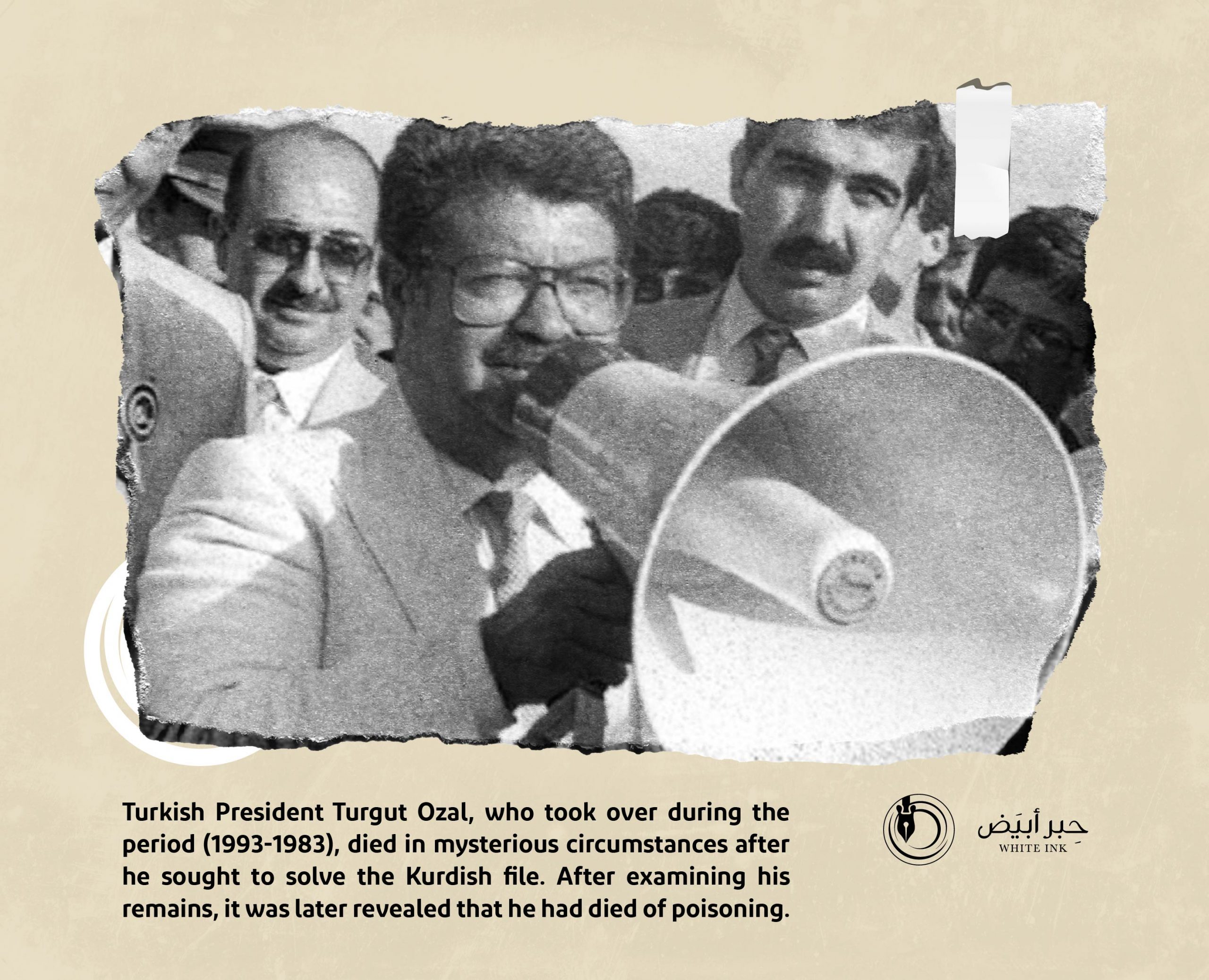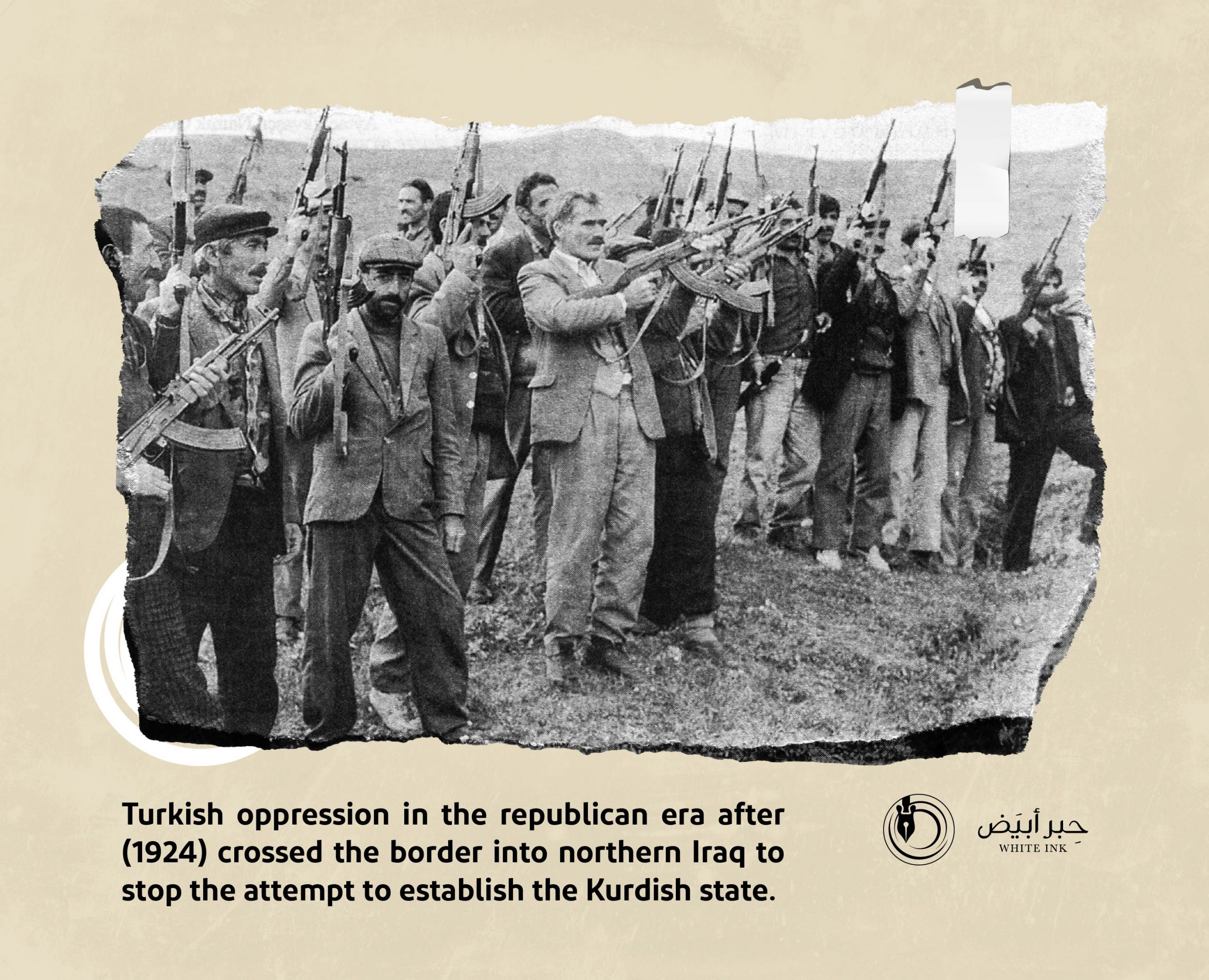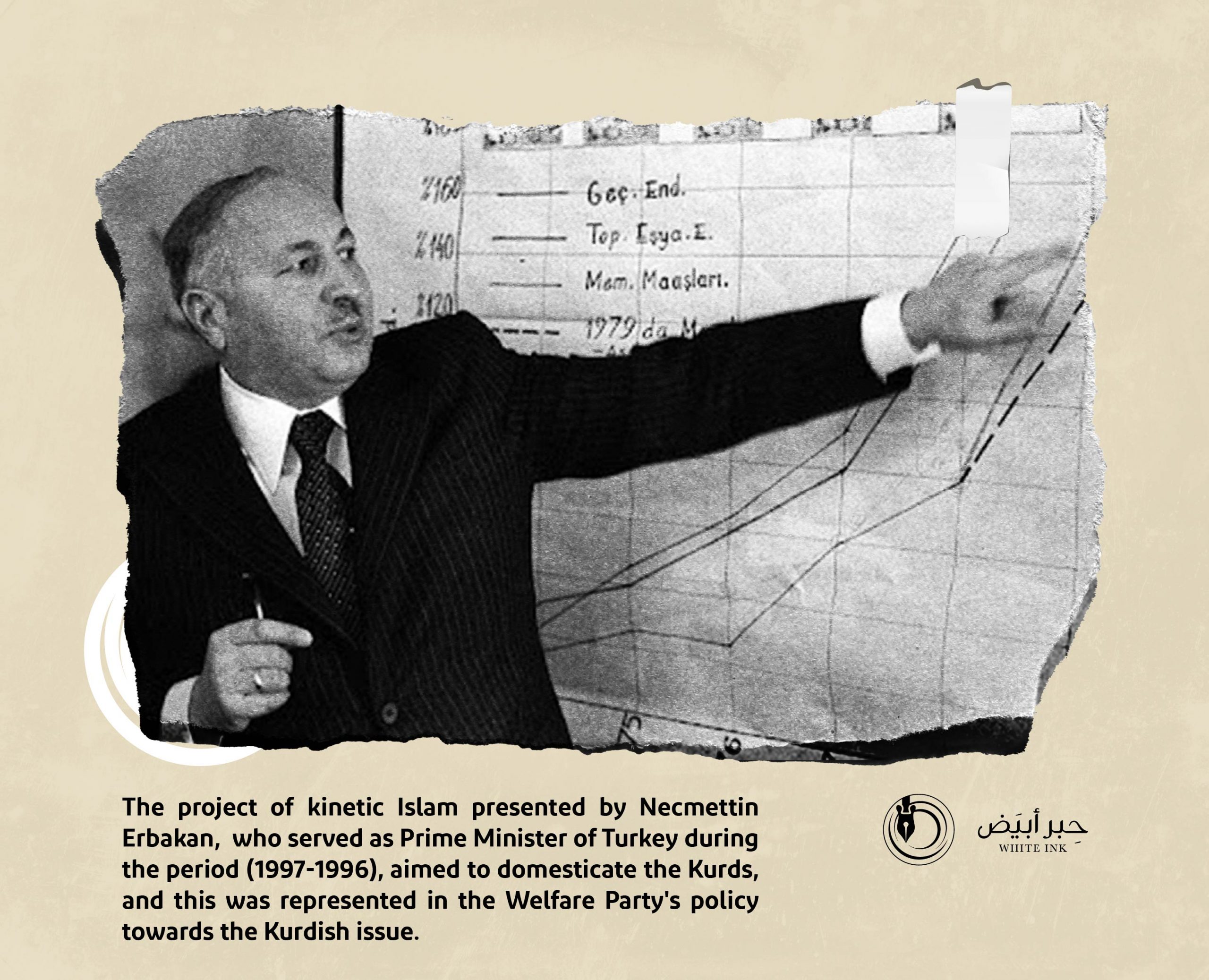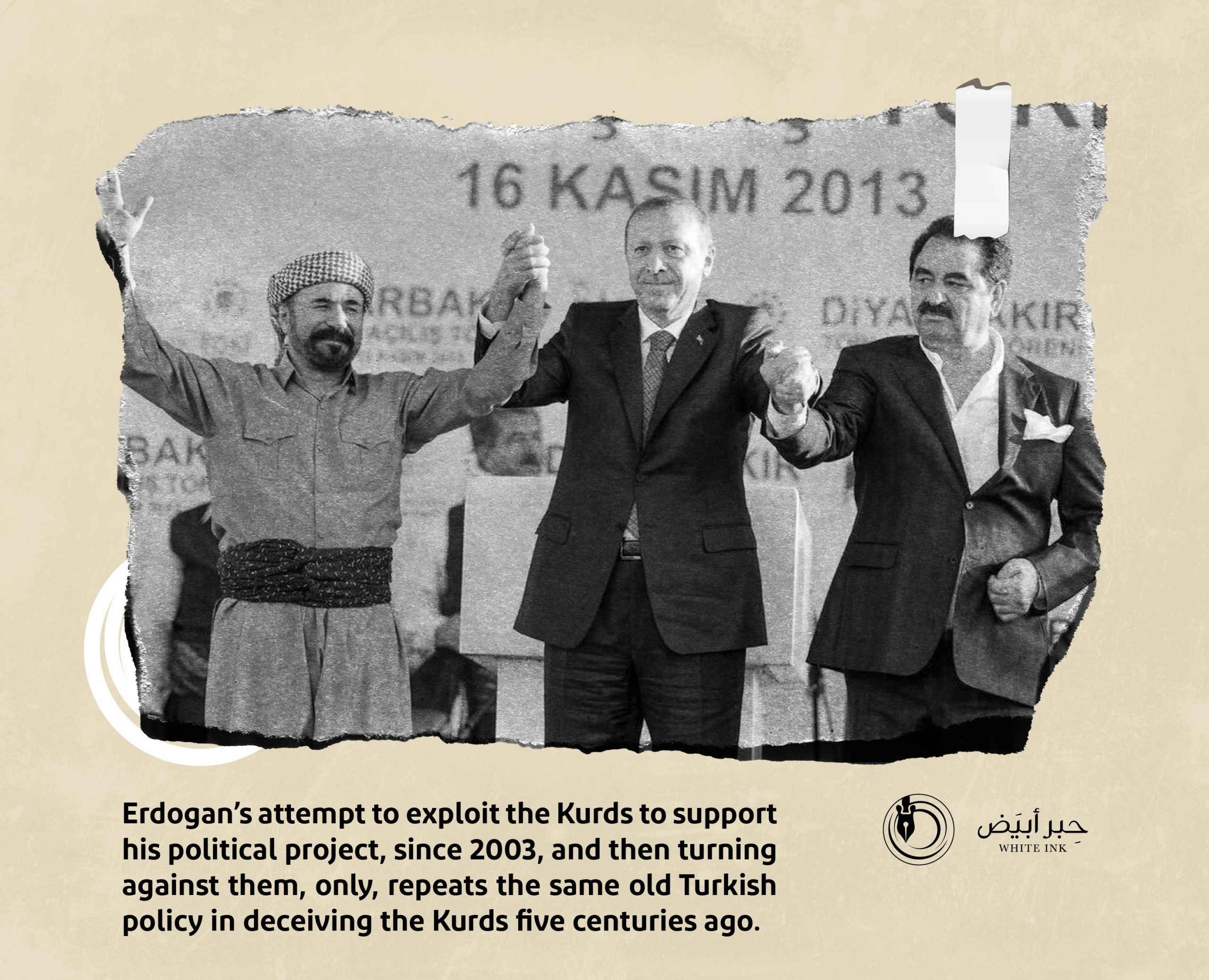
The forensic report confirmed that he had been poisoned
The Kurdish issue caused the sudden death of "Özal" in1993 AD.
Currently, more than 20 million Kurds live in Turkey, and they constitute a percentage estimated at more than 20% of the population. After the Turkish military coup carried out by the Turkish military establishment under the leadership of General “Kanaan Evren” (Turkish: Kenan Evren) 1980, Kurdish nationalism suffered forms of racial discrimination and continuous national oppression. This happened when the Turkish government banned speaking the Kurdish language and fined those who spoke it in public and private life and stressed the prohibition of using the term “Kurd” or “Kurdistan”, and even prevented them from using names of Kurdish origin, as well as forbidding singing in the Kurdish language. The Turkish government issued a constitutional law legalizing the ban. There is no doubt that this is the result of the nationalist ideology of Turanian racism, which was established by the Ottomans and after them Mustafa Kemal Atatürk and his successor Ismet Inonu in modern Turkey, which prohibited all non-Turkish minorities and nationalities from enjoying cultural, social and political rights in particular.
There were violent campaigns by the Turkish government targeting the Kurds, who demanded their rights, and the outcome was numerous massacres. Strict Turkification policies were practiced in harmony with the repressive tendencies of Ataturk with the aim of making Turkey a Western European country by destroying its eastern identity.
The conflict between the Kurds and the Turkish government was continuing, calming down at times and intensifying at other times. The repressive security solution was the one adopted in particular by the various Turkish governments, which gave the Turkish army a free hand among the Kurds, to announce emergency provisions in the Kurdish areas, and to establish military administrations and martial courts there.
The media campaigns launched by the Western press against the military rule in Turkey and its flagrant violation of public life, in addition to the demand of the Turkish masses to return to civilian life, led the Turkish President, General “Kanaan Evren” to declare in 1982 AD that the National Security Council has set a timetable for a return to democratic life. This is done by preparing a draft of a new constitution for the country and holding a referendum on it during the fall, and then preparing a new law for parties that organizes political and parliamentary life in the country. After holding the parliamentary elections and returning to civilian rule, three political parties won, two of which belong to the army. However, the result did not satisfy the Turkish army, as the majority vote was won by the Motherland Party (Turkish: Anavatan Partisi), which brought “Turgut Ozal” (1983-1993) to be prime minister. He began in the slow democratic process or “preparing the way” as described by the Dutch writer “Eric Zurker” in his book “The Modern History of Turkey”. During his tenure in the government, he tried to deal with the Kurdish issue with a new mentality that is ready for agreement and discussion, and to give Turkey’s Kurds the opportunity to discuss their issue from within, in an attempt to understand the reasons and work to reach realistic possible solutions. This was all away from the previous rulings and he also tried to belittle the Kurdish issue by ignoring the taboos that official policies had imposed on the subject. He gave them some cultural rights, partially lifted the ban on the Kurdish language, allowed them to publish publications in the Kurdish language and discussed the establishment of a federation between Kurds and Turks to solve the Kurdish issue. He was close to signing a peace agreement with them, but that matter met with strong official and unofficial opposition.
The Turkish republicans banned the Kurds from speaking their own language and fined anyone who spoke it.
The Turkish military establishment caused the Kurdish issue to be resolved by agreement and discussion.

Ozal’s sudden death halted the entire project. Some analysts believe that the cause of his death was a heart attack. It was recently proven after his body was exhumed and examined that he had died of poisoning. It seems that the Turkish military establishment has realized the danger of this to the republican legacy in Turkey, or what can be called the Kemalist deep state.
Those factors, racist methods and restrictions against Kurdish nationalism, in turn, contributed to the return of the Kurds’ organized military activity in the face of Turkish racist tyranny. This led to the outbreak of a violent war between the Turkish government and the armed Kurdish tribes, led by the Kurdistan Workers Party (Kurdish: Partiya Karkerên Kurdistan – PKK), which has been facing successive Turkish governments. This party was led by Abdullah Ocalan (Kurdish: Ebdullah Ocelan). Many battles took place between the members of this party and the Turkish forces. This led to the exodus of groups of members of this party to the rugged Qandil Mountains (Kurdish: Çiyayên Qendil) in Iraqi Kurdistan and the establishment of military bases for them. The Turkish forces often crossed the Iraqi borders to launch raids on the bases of this party. Battles and clashes continued from time to time between the aforementioned party and the Turkish forces, until the party leader “Ocelan” was arrested in February (1999) with the help of the Israeli Mossad.


- Ibrahim Al-Daqouqi, The Kurds of Turkey, 2nd Edition (Erbil: Aras Publications, 2008).
- Eric Zurker, The Modern History of Turkey, translated by: Abdul Latif Al-Hares (Beirut: Al-Madar Al-Islami, 2009).
- Kawthar Abbas Al-Rubaie, “Turkey and the Kurdish issue: The History, The Geography and the Future”, Baghdad, Al-Mustansiriyah University, The Political and International Journal, Issue 41-42, 2019.


In the Kurdish issue
Erbakan tried to repeat the Ottoman experience in the republican way
The Kurdish issue is considered one of the chronic issues in the history of the Turkish Republic since its establishment (1924) until today, and its roots extend since the era of the Ottoman Empire. Therefore, the writer Oraib Al-Rantawi refers to this matter, saying: “The Kurds and the fundamentalists in modern Turkey are among the most important issues. There are no security solutions, only the democratic political treatment, otherwise Turkey will remain a democratic, imperfect, distorted secular state”.
The Kurdish issue in particular began in the time of Mustafa Kemal Atatürk and his attempt to make “all in one”. This is manifested in the denial of the ethnic identity of the Kurds and the prevalence of the term “Mountain Turks” as a description of the Kurds, a term rejected by all Kurds, because it contradicts their history.
Kemal Ataturk’s view of Turkish citizenship was based on two components: the Turkish and the Kurdish. The actual practice led to the Turkification of society under the pretext of its unity, which did not respect cultural and ethnic pluralism, especially with the exclusion of the Kurdish language from the public space. This is in addition to the prohibition of the old traditional Kurdish celebrations, especially Nowruz, the Spring Festival, which is one of the national manifestations of the Kurds.
The Ottomans, before the Republicans, promoted the Islamic Association to deceive the Kurdish people and achieve their goals, which prompted the Kurds to go to war with the Ottoman Empire in the face of the Safavid state in Iran. Therefore, it was not expected that the secular Turkey would deal with the Kurdish issue through the values of citizenship between the Kurdish minority and the Turkish majority. This is what led to confrontations in the Kurdish regions of Turkey, and even more so, armed confrontations between Turkish forces and the Kurdistan Workers Party (Kurdish: partiya karkerên Kurdistan), which Turkey classifies as a terrorist organization responsible for the deaths of hundreds of Turks.
With the rise of political kinetic Islam in Turkey by Necmettin Erbakan, some people thought the possibility of solving the Kurdish issue, by referring to the Islamic association promoted by the Ottomans centuries before that. The Turkish army did not like the revival of the old policy, so it sacrificed Erbakan and imprisoned him. Far from the dramatic end of Erbakan, the latter did not present a real project to address the Kurdish issue. Rather, his political discourse did not differ from all previous Turkish media discourses and from the old Ottoman plans to try to domesticate the Kurds.
The kinetic Islam in Turkey wanted to solve the Kurdish issue without presenting projects that respect parallel nationalism.

One of the press articles revealed about Erbakan’s speech that at first, he rejected the idea of a Kurdish state in the region, even if this state lies outside Turkey’s political borders, especially in Iraq. This is because the establishment of a Kurdish state in the region will provoke the separatist tendencies of a large bloc of Kurds in Turkey, as it will expose the Turkish constitutional concept to controversy. This concept sees that everyone is Turkish and that the Kurds are Mountain Turks. Therefore the “Kurdish state” project will destroy not only Turkish citizenship, but perhaps the entity of the Turkish state itself.
Taking into account the conspiracy theory, Erbakan sees that there is an American conspiracy that began with the Gulf War and with attacking Saddam Hussein, which is to strike the military power of Iraq to allow the establishment of a Kurdish state in Iraqi Kurdistan. Erbakan cites the speech of an American military commander who believes that the fall of Saddam is inevitable, and that it must be followed by the establishment of a Kurdish state to fill the void that will occur in the region. This American commander suggests – according to Erbakan – that it is necessary to expand the territory of the Kurdish state by annexing some of the Kurdish lands located in Turkey. This American commander writes a scenario for the future of this Kurdish state that it will face a strong rejection, and perhaps military intervention by Turkey, Syria and even Iran, given the presence of Kurdish minorities in this country, which poses a threat to its political cohesion. The American commander believes that the Kurdish state will win in the end if it is provided with the necessary and sufficient armaments for its survival and the imposition of its will in the region. Thus, Erbakan’s speech does not differ from all previous Turkish speeches in adopting a conspiracy theory, and the inability to make progress and present new solutions to the Kurdish issue.
However, some refer to an attempt by Erbakan (1997), through indirect messages, to make a peace attempt with the PKK, and an attempt to make a breakthrough for this chronic issue in the history of the Turkish Republic. This attempt failed. Some believe that the Turkish nationalist elements, in addition to the generals of the Turkish army, prevented the success of this attempt. This attempt is a failure in the agenda of its promoters, because they are well aware of the reaction of the opposition Turkish nationalist currents, especially the Turkish army. Therefore, this attempt was not able to make progress and present new solutions to the Kurdish problem, especially as we hear again about secret and indirect negotiations that took place in Oslo, the capital of Norway, between Turkish and Kurdish elements that lasted from (2008) to (2011). These attempts, like the previous ones, failed, although the Turkish Islamists were the ones who made them. The Turks attribute the failure of these talks to the outbreak of the Syrian revolution in (2011), the change in the situation in the region, and the movements of the Kurds in Syria.
On the Kurdish side, there have been attempts to find a formula for peace with Turkey, the most famous of which is the initiative of the leader of the Kurdistan Workers’ Party, Ebdullah Ocelan, whom Turkey accuses of leading a terrorist organization, and who was arrested by the Turkish authorities and first sentenced to death, then the sentence was commuted to life imprisonment. From his prison, Ebdullah Ocelan presented the initiative to stop the violence between the PKK and the Turkish authorities on the basis of redefining citizenship in the Turkish constitution, and the implementation of the localities system with wide powers in accordance with the regulations of the European Union. Ocelan presented this initiative on the occasion of Nowruz holiday on March 21, 2013, but the developments of the conflict in Syria, the position of Iraqi Kurdistan and the desire of the Turkish army to secure its borders did not lead to tangible results from this initiative.
In his book “Islam, the Kurds, and the Kurdish Nation State”, Christopher Houston provides an important analysis of the Kurdish issue and its position in Turkish history and politics. Houston begins his book with a shocking statement: “The Kurdish majority in southeastern Turkey has been in a state of constant revolution since the proclamation of the republic in Turkey”.
Houston also refers to another very important matter for Turkish foreign policy, which is the impact of the Kurdish issue on Turkey’s relations with neighboring countries, particularly Iraq. He also monitors the repercussions of the Kurdish issue on Turkey’s relations with America and the European Union.
Houston notes the impact of the deteriorating security situation in the Kurdish regions on the economic situation among the Kurds and the futility of development projects undertaken by the Turkish government as a result of the instability in these regions. He monitors the emigration of many Kurdish youths from their homeland in search of a better economic future.
In the end, the author clarifies the dilemma of the Kurdish issue between the position of the Turkish government, which seeks to preserve as much homogeneity as possible between the ethnic community segments, and the position of the Turkish army, which views the Kurdish issue as a mere security problem from the standpoint of combating terrorism. This is in addition to the position of Turkish civil society, which sees the Kurdish problem as a major challenge that calls for confronting issues related to the difference in language and culture and how to secure a degree of social homogeneity while maintaining the minimum right to difference.
Do the Kurds in Turkey constitute a security problem or a multicultural and ethnic societal difference?



- Oraib Al-Rantawi, The Kurds and Fundamentalists in Modern Turkey, Al-Quds Center for Political Studies.
- Necmettin Erbakan’s speech, Western plans to establish a Kurdish state in the region, YouTube.
- Kuwait News Agency, Ocelan Initiative to Stop Violence, 3/21/2013.
- The presentation of the book “Islam, the Kurds and the Kurdish Nation State”, Al-Bayan Magazine, September 31, 2001.

As an extension to the policy of interest and an attempt to win them over in the 2023 elections
"Erdogan" concludes a truce with the Kurds using the method of Ottoman treachery
The Ottomans and Turkish republicans have taken a well-known approach with Kurdish nationalism throughout history. Therefore, they always resort to soft language with the Kurds when they need them most, and as soon as they are finished with the Kurds and no interest is with them, they turn against them with their violent and repressive methods. This is what Selim I and his son Suleiman, and after them, the sultans of the Ottoman Empire, up to the republican era, in which Mustafa Kemal Ataturk approached the Kurds until the end of the political and international crisis at home, then turned against the Kurds and became his next target by pursuing and suppressing them.
Since his political emergence at the turn of the millennium, Recep Tayyip Erdogan, the current president of the Turkish Republic, has dealt intelligently, trying to convince those around him that he is different from his predecessors and does not act on the same principles as theirs. They had previously worked to obliterate the identity of the Kurds and change the names of their families and villages. Erdogan allowed them to rename their villages and regions, restore the names of their families, open a TV channel in the Kurdish language and tell them that he is against the racism and nationalism practiced by many Turks against them.
Erdogan took advantage of Istanbul’s fullness of Kurds after he was its ruler, as he continued to win over and sympathize with the Kurds, assuring them that he would restore their rights to them. He benefited from the great mixing between the Turkish and Kurdish races in society. The Kurds had a great deal of credit for Erdogan’s accession to the premiership in 2003 until he took power in 2014.
After Erdogan was able to reach the presidency of the Turkish state, he began to tyrannize and threaten the Kurds to crush them, and went beyond the order to interfere in the affairs of others when he threatened and announced his stand against any independence of the Kurds or giving them an opportunity to achieve this, whether inside or outside Turkey.
The Kurdish memory still preserves Erdogan's promises to its nationalism, and after it brought him to power since 2003, he turned against it.

Erdogan’s visit to the Kurds was not out of his desire to unite them, but the Turanian interest calls for it. During his visit to Diyarbakir in 2006, the Kurdish-majority region, Erdogan called for cooperation with Ankara. He warned that failure to do so would mean a loss for both sides. These statements by Erdogan were in the aftermath of unrest and violence in the Kurdish regions of Turkey.
When Erdogan was prime minister, he made a historic confession when he stated that his government was working to fix what he considered the mistakes of the past. Those sayings remain an illusion that he used to cover up. The stage of amending and manipulating the constitution was not new to Erdogan, and history is repeated when the confrontation of the Turkish generals with the Kurdish militants seeking their existence erupted. At that time, the Turkish leaders resorted to forcing the Erdogan government to amend the Anti-Terrorism Law to give broad powers to the army and security services, and they treated the events as terrorism, which is opposed by Turkish, European and Western human rights organizations in general.
The Turks are still dealing with multiple nationalities, including the Kurdish ones, with deceit and terrorism.

Contemporary and ancient Ottoman historians avoid dealing with the massacres committed against the Kurds during the history of the Ottoman Empire and its extensions in the present represented by the Turkish Republic currently and in the era of Erdogan in particular. Ekmeleddin Ihsanoglu followed this path in his book “The Ottoman Empire” when he completely ignored Kurdish rights in Turkish history.
The government of the Justice and Development Party (Turkish: Adalet ve Kalkınma Partisi) has taken a repressive approach towards the Kurdish political movement, and no matter how much the Kurds are subjected to repression and pressure, they will be a determining factor in the upcoming presidential elections of 2023. Erdogan knows this well, so it is expected that he will seek to appease the Kurdish side and achieve only a temporary peace, as was done by the Ottoman governments in the past and the Turkish Republic in its beginnings. After the Kurds are exploited to achieve the goal of serving political issues in the interest of the Turkish leaders, the soft language will change with the Kurds.


- Ekmeleddin Ihsanoglu, The Ottoman Empire: History and Civilization (Istanbul: Research Center for History and Arts 1999).
- Turgut Oglu, article titled “The influence of the Kurds in Turkish politics”, Tuesday, March 2, 2021, Independent Arabia.
- Sherzad Al-Yazidi, an article entitled “Escaping from crises, Erdogan resorts to the usual option to suppress the Kurds”, February 16, 2021, Sherzad Al-Yazidi, Sky News Arabia.
- Hussein Jamo, an article titled “The Ottomans and the Kurds… A Confused Alliance and a Renewed Bloody Legacy”, Saturday 16 May 2020, Independent Arabia.





